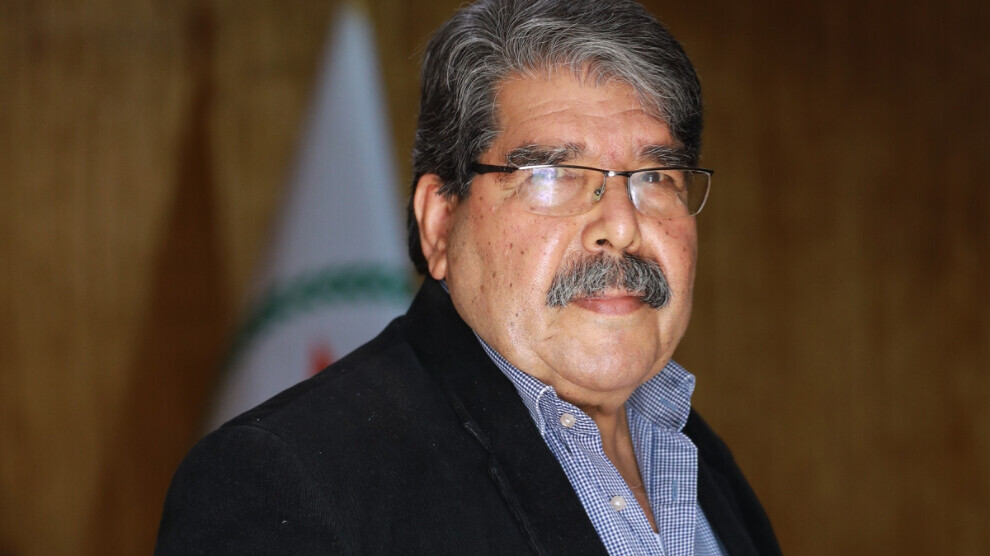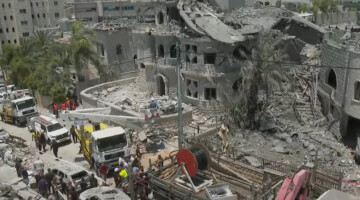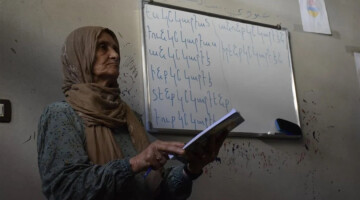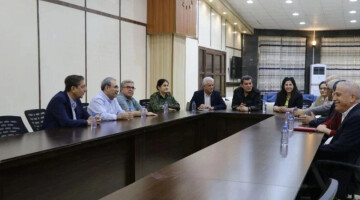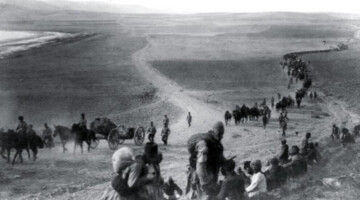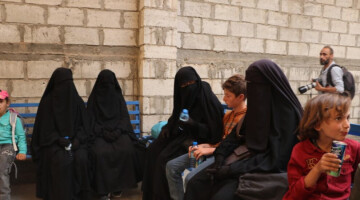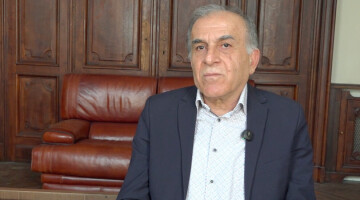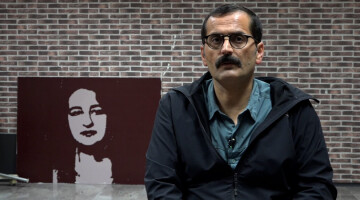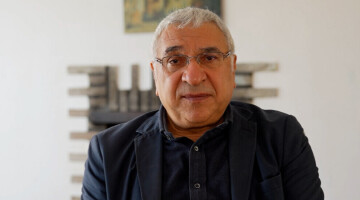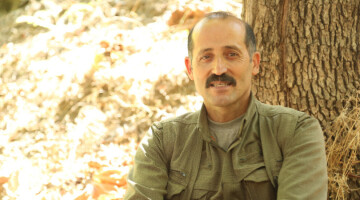Salih Muslim, co-chair of the PYD, analyzed the changing political conditions in the Middle East in an in-depth interview with ANF.
In the first part of the interview, the Kurdish politician underlined that Turkey's political, economic and social collapse can only be stopped by resolving the Kurdish question.
In the second part of the interview, Muslim described the state's involvement in the drug trade and the influence of the so-called "Gang of Five" on politics in Turkey: The five companies Cengiz, Limak, Kolin, Kalyon and Makyol control a large part of the economy in Turkey divided and receive the majority of state contracts, for which troops are sent abroad and jihadists are recruited as mercenaries in Syria.
The Kurds have, meanwhile, fought for a place in the Middle East. Salih Muslim said world powers are still undecided about how to respond to the coexistence project being practiced in Northern and Eastern Syria.
In recent years, the Turkish state has intervened in Azerbaijan, Iraq, Syria, Libya, the Russia-Ukrainian war and many African countries. What goal did Turkey pursue with this?
For its neo-Ottoman project, the Turkish state must bring about changes at home and abroad. It wanted to change something using its own methods, and now Turkey's fate is in the hands of the capital. Five companies in Turkey have everything in their hands. They are the ones who control foreign policy. An elite group now runs Turkish politics, and they are all in the service of Erdoğan.
Apart from these companies, there are other organizations. They include the MHP and Ergenekon. They are responsible for the entire drug trade in Turkey and have relationships with mafia gangs spread across the world. Tons of drugs from Latin America are transported to Europe via Turkey. The situation in Turkey is very chaotic and representatives of the state are involved in these criminal networks. An investigation was started but was not completed because that would have gone too far.
Five Turkish companies wanted to get involved everywhere
These five companies wanted to get involved everywhere in order to expand their empire even further. For example, in Libya. In the 1970s and 1980s they maintained relations with Libya over the oil issue. When the situation in Libya changed, troops were deployed. And when their own soldiers became a problem, they recruited mercenaries in Syria and sent them there. In order to open a trade corridor from Armenia, they turned their attention to Azerbaijan. They even spoke of Azerbaijan as a nation living in two states. After a while, they had to stop because that would have meant dealing with Iran or other giants.
Their investments in Africa, in Sudan, in Nigeria, in Kenya, involved million dollar projects that all went bankrupt. They acted very uncontrollably. Their neo-Ottoman dreams were crumbling day by day. Their own politics turning against them. This led to a major economic problem in Turkey. Where have all the millions of dollars invested in African countries gone? This question has still not been resolved. Why were troops sent to Somalia? None of this is clear.
The Kurdish question is like a black hole
Erdoğan turned politics in the service of these five corporations and thought that in this way he could create a new Ottoman Empire. Now Turkey is on the verge of bankruptcy and cannot solve its own problems. The Kurdish question is like a black hole. Although the figures are not official, it is said that a trillion dollars were spent on the Kurdish question. It is also said that 110,000 people have died in the war against the Kurds so far. The war continues, and it is not clear how far it will go.
Erdoğan's rule is a major threat not only to the people of Turkey and the region, but also to Europe. Look at whom the Turkish state has taken under its wing. There are terrorists from all over the world in Turkey and the areas it occupies in Northern Syria. ISIS emirs, Jabhat al-Nusra, the al-Qaeda affiliate Hayat Tahrir al-Sham, are all there. Erdoğan has gathered these jihadist gangs around him and is using them as a threat to the world. The entire policy of the Turkish state is based on blackmail. With this understanding, the Turkish state cannot pursue either domestic or foreign policy. That's why Turkey's end looks very bleak.
The Kurdish question and the reshaping of the Middle East
We should not forget one fact: for a long time, the Kurds simply did not exist in international politics. After 1923, after the Treaty of Lausanne, they no longer figured in the global balance of power. Only with the imperialist project of redesigning the Middle East were they gradually included in the calculations again. One of the results is the autonomous system created in South Kurdistan, which meets the standards of this project. However, the Kurds are not limited to this region. There are 50 million Kurds in the world. If they were united and made a common policy, then they would have a great influence on world politics.
Such a system should be created not only in Iraq, but also in Syria. There was the Rojava Revolution, which created the autonomous region of Northern and Eastern Syria. People have resisted and defended themselves. The Kurds are now part of the equation. However, a new situation has arisen here. The mere existence of the Kurds might have been accepted, but the Kurds also have their own projects. And it is a project of fraternity and unity of peoples. Recently a new social contract was declared.
The world powers have not yet decided
This project applies not only to Northern and Eastern Syria, but to all of Syria and the Middle East. Everyone has recognized this, including the world powers, Turkey and the regional forces. Everyone was wondering what to do in light of this fact. Some of them, such as Turkey, Iran and Syria, have become enemies of this project. They still want to enslave the Kurds. On the other hand, there are world powers that are just watching and wondering whether to recognize it or not. It's a very different project than her own, and that leads to her indecision. They haven't made a decision yet. Turkey is opposed to this project, but they have not yet decided.
On the other hand, they have had agreements with Turkey since 1952. They still have common interests to this day. However, it is becoming clearer every day whether they will accept this project or not. But it is still not decided, so they remain silent towards the Turkish state. And Turkey is raising the whip against anyone who wants to have a dialogue with it. They have made many agreements with each other for seventy years. Of course, they will not accept our project so easily because they will not give up their own interests. Of course, for this reason, we also have difficulties. On the one hand, the hostile states that act barbarically against us, and on the other hand, the hesitation of the powers that are supposedly friendly to us to recognize our project or not. This means that the situation remains unclear. However, I believe that thanks to the resistance of our people, we have become part of the Middle East equation. No one can leave us out of the Middle East equation. If they want stability, then they should rethink their own policies and recognize the autonomous administration. But if they continue to insist on their old policies, they will not achieve stability.
There is a possibility that the war between Hamas and the Israeli state could spread to other countries. What should the Damascus government's policy be in this process?
Since the Baathists came to power in 1963, politics in Damascus has never been concerned with internal problems. Damascus has always focused on foreign policy and dealt with issues such as the Palestinian question and the Arab League. There is no democratic development in Syria and the population is dissatisfied. Therefore, Damascus must change its policies and solve the problems of the Kurds, Syriacs and other populations inside Syria. As long as the internal problems are not solved, Syria cannot do anything externally. If you can't please the people in your own country, you can't make progress. Various forces are taking advantage of the incompetence in Damascus. The Muslim Brotherhood didn't play a role before, but it has come to the fore in Syria in this turmoil. Syria has never been closer to a solution, but it is not too late, it can still be done. If all the Syrian people came together, discussed their own problems, and reached an agreement within themselves, then we would have nothing else to say. There is a massacre in Palestine today where civilians and children are being murdered. But how can I help him if I cannot achieve unity within myself? First of all, I will develop solutions and opportunities within myself so that I can help those outside of myself. But today the situation in Syria is not good. Today, there will be autonomous administration within Syria, there will be others. We need to find a solution together. The solution to the Palestinian problem is not possible with Hamas and Netanyahu. The solution is for the Jewish and Palestinian peoples, who are part of the Middle East, to come together and find a way to live together. They have to decide. If they want to remain two friendly states, they can do that. When one threatens the other with destruction, it is from a fascist and chauvinistic understanding of the nation-state. And this understanding is not suitable for the Middle East.
As long as the government in Damascus clings to power, it cannot bring about a solution because the people are not on their side and do not accept their position. The solution lies in the hands of the Syrian people. First of all, the Kurdish question must be solved. Without this, the problem in Syria cannot be solved.

